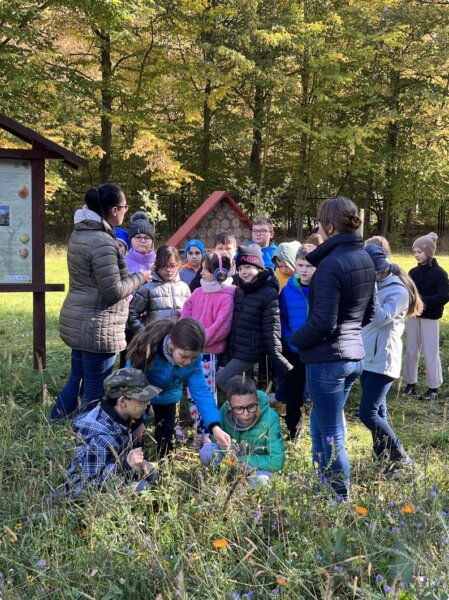Eco-workshop for schoolchildren in a flower meadow in Łódź





Santander Bank Polska held 5 field eco-workshops for children in the Łódź Hills Landscape Park.
Since June 2022, as part of its partnership with the Re:Generation programme (implemented by the UNEP/GRID-Warsaw Centre), the bank has been the sole caretaker of the meadow ecosystem in the Łódź Hills Landscape Park, where it has been working to restore from scratch a flower meadow with an area of over 400 m2. Additionally, it has also built houses for pollinating insects. The restored meadow will be an excellent food base for pollinating insects such as wild bees, butterflies and various species of bumblebees.
During the workshop, pupils from grades 1-3 from schools in Łódź got to know this ecosystem and learned many interesting facts about the pollinators that live there.
The children were introduced to the world of wild pollinators by the main character of the workshop, Frania the bee. Each participant was given a notebook full of creative tasks to consolidate their knowledge in an accessible way. The materials included a colouring book with wild pollinators, a task to choose stickers with products which we owe to them, a rebus, a crossword puzzle and a nature observer card. They asked lots of questions and actively participated in the activities. Experiments, such as building a model of a mason bee’s home, turned out to be particularly attractive. The children also had the opportunity to go to the meadow and see the pollinator „hotel” (partly inhabited:)) and the flowers still in bloom.

The workshop was attended by 130 schoolchildren and many of them already volunteered for the spring edition of the classes.
By taking part in the class, the children learned about the role of pollinating insects and their impact on human life. Thanks to attending the workshop, pupils:
- are able to recognise several species of pollinating insects,
- can name several nectar-producing plants,
- appreciate the work of pollinating insects in providing food for humans and animals
- are able to name several species of plants useful to pollinators
- know that without pollinators, there would be no honey, but also no fruit or vegetables
- can name measures aimed atat protecting pollinating insects.




